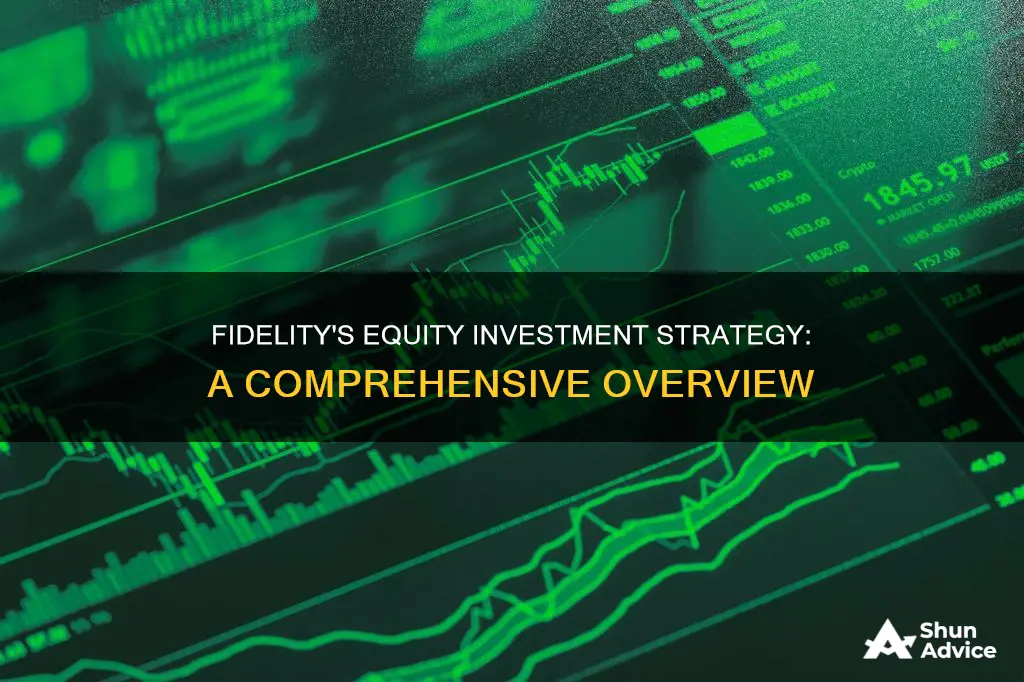
Fidelity offers a range of investment strategies and products to help customers meet their financial goals. The company provides investment advisory services, including dedicated advisors and teams, digital investing with coaching, and professionally managed stock portfolios. Fidelity also offers a variety of investment accounts, such as brokerage accounts, IRAs, and 401(k) plans, with a wide selection of investment options like stocks, bonds, mutual funds, ETFs, and options. The company's investment strategies focus on diversification, tax-efficiency, and long-term growth, with tools and resources to help customers make informed decisions.
| Characteristics | Values |
|---|---|
| Investment strategies | Dollar-cost averaging, tax-smart investing, creating an exit strategy, mutual funds and ETFs, target date funds, robo advisors, managed accounts |
| Mutual funds | Fidelity Mutual Funds cover all asset classes of mutual funds, from domestic equity to specialized sectors |
| Investment advisory services | Fidelity Managed FidFolios, Fidelity Advisory Services Team, Fidelity Wealth Management, Fidelity Private Wealth Management |
| Investment goals | Long-term growth, dividend income, tax-loss harvesting, diversification and growth potential |
| Investment types | Stocks, mutual funds, ETFs, options, bonds, fixed income, precious metals, crypto |
| Investment accounts | Brokerage accounts, IRAs, 401(k)s, Roth IRAs, traditional IRAs |
What You'll Learn

Fidelity's investment strategies for beginners
Investing can be daunting for beginners, but Fidelity has a few investment strategies to help you get started. Here are some tips to help you make informed decisions:
Figure out your investment goals:
Ask yourself, "What am I investing for?" This is an important first step because it will guide your choices and strategies. Many people start by investing for retirement, but you may have other financial goals in mind as well.
Choose the right account type:
The type of account you choose will depend on your investment goals and personal circumstances. Here are some common account types to consider:
- Brokerage Account: These are flexible and accessible, as anyone over the age of 18 can open one. You can add funds whenever you want and have access to a wide range of investment options. However, brokerage accounts are taxable, so you'll generally need to pay taxes on any investment profits.
- 401(k): This is an employer-sponsored retirement plan, often with tax advantages and potential employer contributions. It offers high contribution limits and tax-advantaged investment growth potential. However, there are rules and restrictions on contributions, withdrawals, and investment choices.
- Individual Retirement Account (IRA): IRAs offer tax benefits similar to 401(k)s, with more flexibility and control. You can contribute whenever you like and have a wider range of investment choices. However, there are rules and restrictions on eligibility, contribution limits, and withdrawals.
Open your account and fund it:
Once you've chosen your account type, it's time to open your account and start funding it. If you're using a 401(k), contributions are typically made through payroll deductions. For IRAs or brokerage accounts, you can deposit a lump sum and then add to it as you're ready. Fidelity suggests eventually aiming to save 15% of your income toward retirement each year, including any employer match.
Pick your investments:
This is where you decide what to invest in. You can choose from individual stocks and bonds, mutual funds or ETFs, or hire a professional manager. Here are some things to keep in mind:
- Individual Stocks and Bonds: This option requires more time and research to build a diversified portfolio. It's a good choice if you want more control over your investments.
- Mutual Funds or ETFs: These pool money from many investors to purchase a collection of stocks, bonds, or other securities. They offer an easy way to diversify your investments and can be used as building blocks or all-in-one funds. Target-date funds are a type of mutual fund designed for retirement savings with a specific target date in mind.
- Hire a Professional Manager: If you're unsure or don't have the time to manage your investments yourself, consider hiring a professional. Robo-advisors like Fidelity Go® offer low-to-no-cost professional management by using computer-based money management.
Make your purchases:
Now it's time to buy your chosen investments. For stocks, mutual funds, and ETFs, you'll typically need the investment's ticker symbol to place your order. In a 401(k), you can set up your investment choices and regular contributions at the same time. Remember that investing carries risks, and the value of your investments may fluctuate.
Monitor your investments:
Congratulations, you're now an investor! It's important to remember that investments can vary in the short term, and checking them too often may increase your risk perception. Focus on your long-term goals and periodically review your investment plan to ensure it aligns with your financial situation and risk tolerance.
Coronation Funds: A Guide to Smart Investing
You may want to see also

Fidelity's mutual funds
- Income-Oriented Funds: These funds invest in stocks that pay dividends in line with or higher than the broader market, offering an alternative to bond investing with potential inflation protection and capital appreciation.
- Large Blend Funds: These funds invest primarily in companies with market values greater than $10 billion, combining growth- and value-oriented stocks.
- Small/Mid Blend Funds: These funds invest primarily in companies with market values below $10 billion, offering a mix of growth- and value-oriented stocks.
- Large Growth Funds: These funds focus on companies with market values greater than $10 billion that are poised for growth, typically prioritizing capital gains over income.
- Small/Mid Growth Funds: These funds invest in companies with market values between $2 billion and $10 billion that are expected to grow, aiming for capital gains.
- Large Value Funds: These funds target companies with market values greater than $10 billion that are considered undervalued by the market based on various measures such as price-to-earnings ratio or dividend yield.
- Small/Mid Value Funds: Similar to Large Value Funds, these funds focus on companies with market values below $10 billion that are undervalued by the market.
- Go-Anywhere Funds: These funds have the flexibility to seek investment opportunities across different regions and sectors.
- International Equity Funds: By investing in companies outside the U.S., these funds offer exposure to the growth potential of other parts of the world and help lower portfolio volatility through diversification.
- Fixed Income Funds: These funds aim for capital preservation and include various types such as short duration, corporate, government, diversified/opportunistic, high yield, international, and municipal bond funds.
- Index Funds: With generally lower management fees, potential tax efficiency, and reduced portfolio turnover, these funds seek to mirror the performance of specific indexes, such as the S&P 500 or Russell 2000.
- Money Market Funds: Emphasizing stability and safety, these funds offer short maturities and minimal credit risk, along with choices to suit retirement and non-retirement investing goals.
Fidelity also offers a range of specialized funds, such as sector funds, asset allocation funds, and target date funds, providing investors with a diverse set of options to match their investing style and goals.
Mutual Fund Investment: Choosing the Right Type
You may want to see also

Fidelity's tax-smart investing techniques
Fidelity offers a range of tax-smart investing techniques to help investors reduce the amount of taxes they pay on investment income or gains. Here are some of the key techniques:
Tax-Loss Harvesting
Tax-loss harvesting involves selling investments at a loss to offset capital gains taxes. Investors can deduct these losses from their capital gains, potentially lowering their tax bill. This strategy can help investors keep more of their money invested and working for them. It's important to consider the potential impact on investment performance and the complexity of managing and monitoring investments when using this technique.
Invest Through Tax-Advantaged Accounts
Fidelity recommends investing through tax-advantaged accounts such as a 401(k), IRA, 529, or HSA for retirement, education, or healthcare savings. These accounts offer tax deductions or tax-free growth, helping investors keep more of their profits.
Understand Capital Gains Tax Rates
Capital gains taxes are levied on the profit from selling an asset, such as stocks, mutual funds, or ETFs. The tax rates differ for short-term gains (held for a year or less) and long-term gains (held for more than a year). Generally, short-term capital gains are taxed at a higher rate. Therefore, investors can save on taxes by holding investments for more than a year before selling.
Asset Location and Selecting Tax-Efficient Securities
Fidelity also mentions "asset location" and "selecting tax-efficient securities" as part of their tax-smart investing techniques. While they do not provide specific details on these strategies, they likely involve placing different types of investments in specific account types to minimize taxes and selecting investments that are more tax-efficient.
Fidelity's Dividend Income Strategy
Fidelity's Dividend Income Strategy, a separately managed account (SMA), seeks to provide long-term growth and dividend income while minimizing volatility. This strategy includes ongoing tax management and the potential for year-round tax-loss harvesting opportunities. It focuses on higher-quality dividend-paying stocks within the S&P 500 Index that have the potential to sustain and grow dividends over time.
Rental Property vs Mutual Funds: Which is the Better Investment?
You may want to see also

Fidelity's long-term investment strategies
Fidelity offers a range of long-term investment strategies, catering to different investor needs. Here are some of the key strategies and features:
Well-Diversified Portfolio:
Fidelity emphasizes the importance of building and maintaining a well-diversified portfolio. By allocating assets across different asset classes, investors can reduce risk and improve long-term performance. Regular rebalancing is crucial to ensure the allocation stays close to its target.
Tax-Smart Investing:
Fidelity recommends taking advantage of tax-smart investing techniques to maximize returns. This includes strategies such as asset location, selecting tax-efficient securities, and tax-loss harvesting. Taxes can significantly impact long-term investment returns, so managing tax exposure is vital.
Long-Term Perspective:
Fidelity encourages investors to stick to their investment plans and maintain a long-term perspective. Emotional decisions during tough markets, such as moving to cash or switching to conservative assets, can be counterproductive. Historically, investors who stay invested through downturns are more likely to benefit from subsequent market recoveries.
Family Involvement:
Involving your family in financial planning can help create a shared vision and identify opportunities to reduce the overall tax burden. It can also provide support and accountability to stick to the investment plan.
Professional Guidance:
Fidelity offers the option of partnering with a trusted financial professional for personalized investment advice. While this comes at a cost, industry studies suggest that professional financial advice can add up to 5.1% to portfolio returns over time.
Mutual Funds:
Fidelity has a strong reputation for its mutual funds, offering a wide range of no-transaction-fee funds. Notably, they introduced index funds with zero expense ratios, providing a cost-effective option for investors.
Educational Resources:
Fidelity provides extensive educational resources and research tools for investors of all levels, from beginners to active traders. This includes resources for retirement planning, stock trading, and more.
Trading Platforms:
Fidelity offers two trading platforms: Fidelity.com and Active Trader Pro. Both are free and provide advanced screeners, research tools, and strategy-testing capabilities. The Active Trader Pro platform is customizable and includes features like multi-trade tickets and advanced options tools.
Customer Support:
Fidelity is known for its strong customer support, offering 24/7 assistance through various channels, including phone, email, chat, social media, and physical branches.
High Interest on Uninvested Cash:
Fidelity automatically directs uninvested cash into a money market fund, providing a competitive return. This feature ensures that idle cash generates decent interest for investors.
Invest Your 401k: Index Funds for Secure Retirement
You may want to see also

Fidelity's investment advisory services
Fidelity Go®
Fidelity Go® is a robo-advisor service, which is a simple and relatively inexpensive way to get help building an investment strategy. It is an affordable digital financial service that uses technology to help automate investing, based on information provided by the investor. There is no advisory fee for balances under $25,000, and then a 0.35% annual fee for balances of $25,000 or more, which includes unlimited 1-on-1 coaching calls.
Fidelity Managed FidFolios®
Fidelity Managed FidFolios® is a service that provides professionally managed stock portfolios. It requires a minimum investment of $5,000. Tax-smart investing techniques are built into the portfolios, and they are managed by a team of professionals.
Fidelity Advisory Services Team
The Fidelity Advisory Services Team provides access to a team of advisors, by phone or video, who will help keep the investor's strategy aligned with their goals through portfolio management, annual reviews, and tax-smart investing techniques. The minimum investment for this service is $50,000.
Fidelity® Wealth Management
Fidelity® Wealth Management is a service that provides a dedicated advisor to help with financial planning and investment management. The advisor will help the client establish a clear view of their financial situation, define and prioritize financial goals, and help them understand their investment options. The minimum investment for this service is $50,000.
Fidelity® Private Wealth Management
Fidelity® Private Wealth Management is an advisor-led team that provides comprehensive planning, advice, and investment management. The team can also coordinate with the client's outside advisors, such as accountants or attorneys. To be eligible for this service, clients typically need to invest at least $2 million through Fidelity® Wealth Services or Fidelity® Strategic Disciplines and have a total of at least $10 million in investable assets.
Additional Services
Fidelity also offers a range of additional services, such as planning tools, the ability to build your own portfolio, and Fidelity® Freedom Funds, which are a simple approach for retirement investing.
Explore Top Funds for Payment Company Investors
You may want to see also
Frequently asked questions
Fidelity's equity investment strategy offers a range of benefits, including a well-diversified portfolio, tax-smart investing techniques, and access to a team of advisors. Their strategy also includes a focus on long-term growth and dividend income, with the potential for reduced volatility compared to the US stock market.
As with any investment, there are risks involved. The value of your investment may fluctuate, and you may gain or lose money. It's important to remember that investing in stocks involves risk, including the loss of principal.
Fidelity stands out among other brokers due to its low costs, extensive educational resources, advanced trading features, and excellent customer support. They offer a wide range of investment options, including stocks, bonds, mutual funds, ETFs, and more.
To get started, you can open a standard brokerage account, IRA, or Roth IRA with Fidelity. You will need to provide personal information and employment details, and then you can fund your account by transferring money from a bank or another brokerage account.







